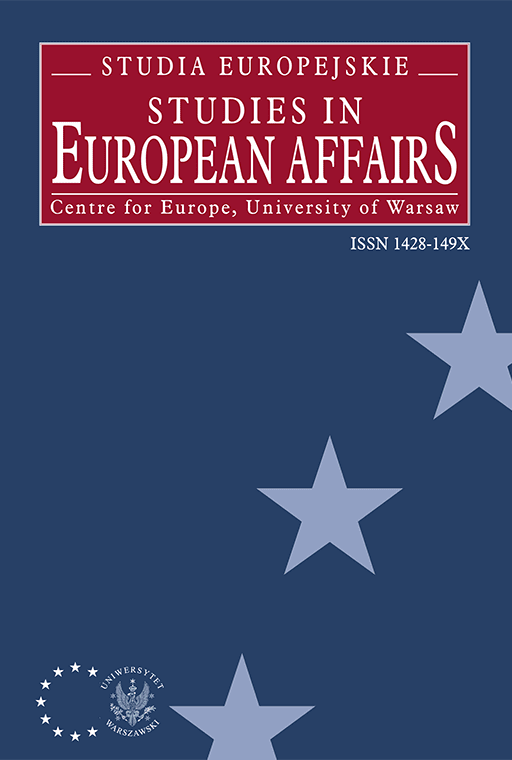
ISSUE: 1/2015
- Volume 73
- Number 1
- 2015
Subscribe NEWSLETTER
Studia Europejskie –
Studies in European Affairs
ISSN: 1428-149X
e-ISSN: 2719-3780
License
Articles published in the journal are under a Creative Commons Attribution – Non Commercial – No Derivatives 4.0 International License
Od Traktatu o Unii Europejskiej do Europejskiej Agendy dla Kultury – narodziny i rozwój polityki kulturalnej UE
From the Treaty on European Union to the European Agenda for Culture – the Birth and Development of the EU Cultural Policy
Abstract
In 2013, the European Union celebrated the twentieth anniversary ofthe entry into force of the Treaty of Maastricht, while the European culture, the cultural sector and cultural institutions – the twentieth anniversary of the birth of the EU cultural policy. Article 128 of the Treaty contained the first definition of the goal, powers and scope of activity of the Community in the field of culture. Currently, the EU’s competences in the field of culture are specifi ed in Article 167 of the Treaty on the Functioning of the European Union (former Article 151 of the Treaty of Amsterdam). In the first part of this paper, the author outlines, in chronological order, the legal basis for the EU cultural policy laid down in each of the Treaties and analyses the ‘soft’ instruments used for shaping this policy that have determined its development in the years 1992–2013. The second part of the article focuses on the European Agenda for Culture, the first strategic document in which the EU has defi ned long-term goals and priorities of cultural policy. The document, adopted in 2007, was to become the response of the Community to new challenges in the area of European culture and to initiate the process of shifting culture from the peripheryto the mainstream of EU policies. The article points to the importance of
the European Agenda for Culture in the history of the EU cultural policy, not only because it shows a change in the EU’s rhetoric regarding the place and role of culture in the process of integration but mainly because the priorities adopted in the document, as well as new mechanisms of decision-making and cooperation between the EU, its Member States and the cultural sector, have determined the shape of the EU cultural policy, including the shape of EU programmes and the measures taken in the field of culture after 2007. The dynamism of implementing the objectives of the European Agenda for Culture also shows that – in the long run – the Agenda will have an impact on the future condition and development of culture in Europe. Will incorporating the EU cultural policy in the Agenda shift culture from the periphery to the mainstream of EU policies? What price will the cultural sector and culture have to pay for this shift and will it not be too high? What will be the impact on culture of the progressive economisation of culture and the introduction of new key words to the language of the EU cultural policy (creativity–innovation–growth), which have dominated the point of view on the role and place of the cultural sector in Europe after 2007. Can the EU fi nd a balance in supporting the economic and social dimensions of culture, and can it support culture as an area of autonomous values, actions as well as complex identities that cannot be reduced to one common denominator? The conclusion ending the text concerns the future of the EU cultural policy and the paradox that it can become part of. Because what we are witnessing now is an attempt to negotiate a partial ‘soft’ communitisation of the EU cultural policy within the limits imposed by Article 167 TFEU. It is possible, however, that
in the future the same limits, so fervently criticised over the years, will be the basis for insisting on the autonomy of culture and its values and needs not defi ned by the market.
Language: Polish
Pages: 65-89
How to Cite:
Harvard
Jurkiewicz-Eckert, D. (2015) "Od Traktatu o Unii Europejskiej do Europejskiej Agendy dla Kultury – narodziny i rozwój polityki kulturalnej UE". Studia Europejskie – Studies in European Affairs, 1/2015, pp. 65-89.